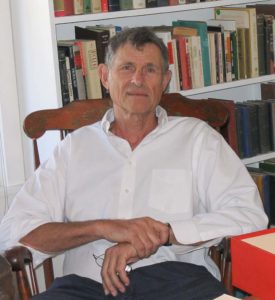Meet Stephen Davenport
My first full-time job, after graduating from college and then spending two years in the Navy as the Korean War wound down, was as a Wall Street banker. I chose that work because my wife and I wanted to live in NYC and go to theater as often as we could afford, and also because it was an acceptable screen for a young, privileged WASP to hide behind while I wrote the Great American Novel.
By staying up late every night, I managed to produce the most self-indulgent, sophomoric novel ever written – except by people were actually still sophomores – and I mean in high school! Somehow, it managed to get the attention of an editor at Doubleday, who wrote me a few pages on how I might rewrite it to make it publishable. But I soon found I could not rewrite it. In the time it took to compose the novel, I had outgrown its premise entirely. So I buried the manuscript under the shirts in my bureau drawer and decided to take some time off from writing to catch up on sleep.
But I couldn’t sleep. Because now without the novel to think about, I thought about how ardently I didn’t want to get up in the morning and spend the whole day pretending to be a banker. I was amazed that no one caught me out. I would have confessed: this is not me, but that didn’t happen and I was soon promoted up the next rung on the young executives’ ladder. My parents were delighted and relieved. Their son was climbing upward along an acceptable path. But my college friends, when I told them I was a banker, either laughed or looked concerned. Soon I’d own a house in the suburbs, take the train to the City every morning, reading The Wall Street Journal, like a character in a story by John Cheever.
I started perusing employment advertising in The New York Times and happened upon one for for a teacher of English and coach of football, basketball and track at a boarding school. The position had come open too close to the beginning of the academic year for the school to have time to interview more than a few candidates. That’s why I got the job. It was one of the luckiest days of my life.
For the next three decades I served in Independent day and boarding schools. They all had their own beloved, idiosyncratic cultures like that of the fictional Miss Oliver’s School for Girls. I found that purveying my passion for literature to the still supple minds and hearts of teenagers was all the satisfaction I needed. I never had to ask: Why am I doing this? And besides, I never had to wear a suit!
I didn’t have to do any research for Saving Miss Oliver’s, No Ivory Tower, or The Encampment. Nor for Ninety-Day Wonder. I simply lived the life.

